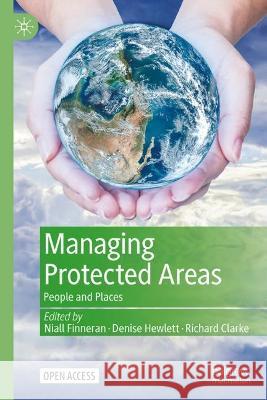Managing Protected Areas: People and Places » książka



Managing Protected Areas: People and Places
ISBN-13: 9783031407826 / Angielski
Managing Protected Areas: People and Places
ISBN-13: 9783031407826 / Angielski
(netto: 191,66 VAT: 5%)
Najniższa cena z 30 dni: 192,74
ok. 16-18 dni roboczych.
Darmowa dostawa!
Table of Contents
List of Contributors
Chapter 1: People and Places Matter: From Theory to Practice. Introduction.
Niall Finneran & Denise Hewlett with Richard Clarke
Chapter 2: What does the Global Biodiversity Framework mean for protected and conserved areas?
Nigel Dudley
Chapter 3: Landscapes of the Romantic Sublime: the legacy of nineteenth-century artistic visions and contributions to the development of the management of natural heritage.
Niall Finneran
Chapter 4: Islandscapes: tourism, Covid, climate change and challenges to natural landscapes. A Caribbean perspective and view from Barbados.
Niall Finneran & Tara Inniss
Chapter 5: Managing heritage landscapes of cultural value: a view from the National Trust portfolio in Purbeck, southern England.
Tracey Churcher & Niall Finneran
Chapter 6: Between high and low tide. Participatory approaches to managing England’s coastal and riverine natural and cultural heritage: a case study from the CITIZAN initiative.
Oliver Hutchinson & Niall Finneran
Chapter 7: Managing a UNESCO World Heritage Site in a Post-Colonial, Post-Conflict and Post-Disaster Destination. The Case of the Haitian National History Park.
Jocelyn Belfort, Hugues Séraphin & Godson Lubrun
Chapter 8: Sustainable project management of green spaces, protected and conserved areas – opportunities and challenges.
Malgorzata Radomska, Richard Clarke & Denise Hewlett
Chapter 9: (Re)connecting with Nature: Exploring Nature Based Interventions for Psychological Health and Wellbeing.
Debra Gray, Denise Hewlett, Julie Hammon & Stephanie Aburrow
Chapter 10: Significant Spaces: Exploring the Health and Wellbeing Impacts of Natural Environments.
Denise Hewlett, Debra Gray, Richard Gunton, Tom Munro, Sheela Agarwal, Martin Breed, Chris Skelly, Philip Weinstein, Ainara Terradillos, Natalia Lavrushkina & Danny Byrne
Chapter 11: Judaism and Engagements with Nature: theology and practice.
Christina Welch & Neil Amswych
Chapter 12: Islam and Engagements with Nature; theology and practice.
Christina Welch & Fahima B. Rahman
Chapter 13: What Have we Learned from the Impact of the Pandemic on our Relationship with Nature? The Importance of Views from Home.
Marco Garrido-Cumbrera & Olta Braçe
Chapter 14: Impacts and Lessons Learned from the COVID-19 Pandemic for Protected and Conserved Area Management.
Mitali Sharma, Mariana Napolitano Ferreira, Rachel Golden Kroner & Mohammed K. S. Pasha
Chapter 15: Tourism and Visitor Management in Protected Areas Post Pandemic: the English Context.
Denise Hewlett, Richard Gunton, Debra Gray, Ainara Terradillos, Sheela Agarwal, Natalia Lavrushkina & Danny Byrne
Chapter 16: Climate Change - Protected Areas as a Tool to Address a Global Crisis.
Zachary J. Cannizzo, Elise Belle, Risa Smith, Tom Mommsen
Chapter 17: The Virtual Wild: Exploring the Intersection of Virtual Reality and Natural Environments.
Simone Grassini & Eleanor Ratcliffe
Niall Finneran is Professor of Historical Archaeology and Heritage at the University of Winchester, UK. He is the author of over 100 publications which focus on heritage, archaeology and anthropological topics focusing mainly upon the Caribbean and Africa. He is a fellow of the Society of Antiquaries of London and has directed fieldwork projects in Africa, Asia, Europe and the Americas.
Denise Hewlett is Professor of Research-Knowledge Exchange at the University of Winchester, UK and is Visiting Professor at Bournemouth University, UK. She specializes in leading national and international research partnerships. Denise works with institutions including the International Union for Conservation of Nature, European Union Environmental and Research Directorates and in UK, as Trustee for National Association of Areas of Outstanding Natural Beauty (NAAONB). She is a member of the Landscape Institute, and Fellow of Royal Geographic Society.
Richard N Clarke is an environmental professional, executive coach, and change management consultant with over thirty-five years of experience. He has worked with organisations, teams, and individuals to enable environmental conservation and enhancement through strategic management, policy development and organisational management. He is a Fellow of the RSA.
This open access book brings together 16 specially commissioned chapters drawn from a range of different professional-practitioner and academic global perspectives on the importance of the relationship between people and green and blue spaces. It focuses on issues surrounding the importance of natural environments on public health and wellbeing, and the environmental, cultural, and social importance of green and blue spaces that can result through responsible and sustainable adaptive management processes. It explores how the Covid-19 pandemic forced reconsiderations of our relationship with these natural spaces and highlights the important impact of the pace of climate change. While not pretending to have the answers, the stimulating and imaginative contributions embrace rich perspectives drawn from backgrounds as diverse as heritage studies, tourism, conservation, geography, policy formulation, public health, environmental health, research methods, history, literature, art, and theology.
Niall Finneran is Professor of Historical Archaeology and Heritage at the University of Winchester, UK. He is the author of over 100 publications which focus on heritage, archaeology and anthropological topics focusing mainly upon the Caribbean and Africa. He is a fellow of the Society of Antiquaries of London and has directed fieldwork projects in Africa, Asia, Europe and the Americas.
Denise Hewlett is Professor of Research-Knowledge Exchange at the University of Winchester, UK and is Visiting Professor at Bournemouth University, UK. She specializes in leading national and international research partnerships. Denise works with institutions including the International Union for Conservation of Nature, European Union Environmental and Research Directorates and in UK, as Trustee for National Association of Areas of Outstanding Natural Beauty (NAAONB). She is a member of the Landscape Institute, and Fellow of Royal Geographic Society.
Richard N Clarke is an environmental professional, executive coach, and change management consultant with over thirty-five years of experience. He has worked with organisations, teams, and individuals to enable environmental conservation and enhancement through strategic management, policy development and organisational management. He is a Fellow of the RSA.
1997-2026 DolnySlask.com Agencja Internetowa
KrainaKsiazek.PL - Księgarnia Internetowa









